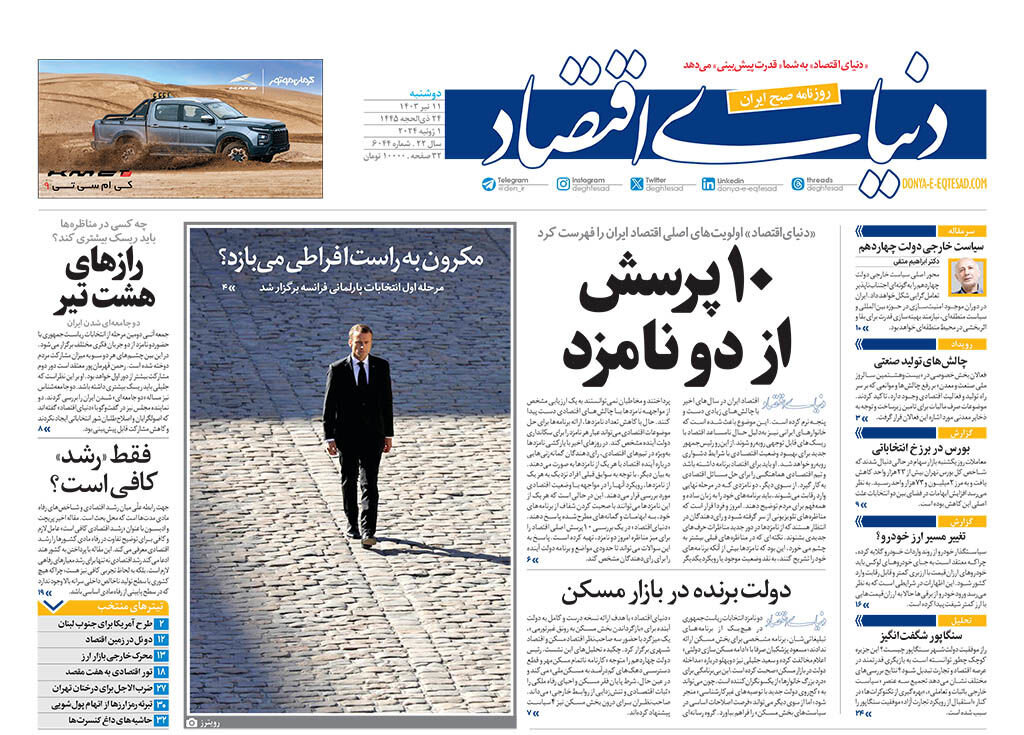Interaction and constructive action

TEHRAN - Donya-e-Eqtesad devoted its editorial to the main axis of the foreign policy of the 14th government and wrote: Iran's foreign policy in the Raisi government has been based on signs of resistance in strategic action towards the great powers and the United States, but the fact is that in this era, more than any other government in the past years, mechanisms related to secret diplomacy based on public diplomacy mechanisms have been used.
In Iran's strategic atmosphere, any interaction with the United States will be based on the prerequisite of power. In the current situation, the support of the military, security, and strategic institutions of the established governments has been one of the main factors in finding their role in cooperation and secret diplomacy in regional environments. In a situation where Iran and many other countries in the region are facing signs of crisis and threats, it is natural that agents of the country's foreign policy and national security use the main axis of their behavior based on cooperative role-finding and flexible action to maximize national interests.
Iran: Canada is against Iran's national security
In an analysis, the Iran newspaper discussed Canada's anti-Iranian policies and said: The Canadian government, in its latest action against Iran, prevented our country from holding presidential elections in this country. In recent years, by accusing the Islamic Republic of Iran of violating human rights, the Canadian government has claimed the right to directly interfere in Iran's internal affairs. Canada's wide-ranging efforts against Iran started a few years ago and Justin Trudeau has especially taken over its leadership. Therefore, it shows that on behalf of the Zionist regime and Western circles, Canada has taken on the task of advancing part of the anti-Iranian project. Applying chain sanctions, supporting opposition groups, and sheltering economic corruptors who escaped from Iran, which are clear examples of interference in Iran's internal issues, are the tasks that have been assigned to Canada in this direction to overthrow the Islamic regime of Iran.
Ham Mihan: Iran's elections and relations between Tehran and Russia
In a note, Ham Mihan discussed Iran-Russia relations after the Iranian elections and wrote: Currently, it seems that the relations between Iran and Russia have not changed. The main presidential candidates sent the message that their foreign policy priority is to reduce sanctions and improve the economic situation and a special relationship with Moscow. Slowing down the momentum of improving relations with Russia is not so difficult. But if the Leader of Iran sees a need at any time based on the interests of the system, he will change the course of Iran's relations with Russia. Two factors can influence his decision: sanctions and the deteriorating economic situation. Considering the atmosphere of Iran's foreign policy and the fact that there is no positive bias towards Iran's reconciliation with its enemies, the transformation in the relations between Tehran and Moscow will probably happen gradually. Experience has shown that Iran quickly learns about the unfortunate realities of its relationship with the West and turns to Moscow once again. Finally, there is no possibility of an immediate and profound change in the relations between Russia and Iran, but if the new president can start the process of lifting the sanctions, the current form of the relationship will disappear in the medium term.
Hamshahri: The failure of the Western saboteurs’ movement against Iran's elections
In an article, Hamshahri dealt with the enemy's attempt to destroy the integrity of Iran's elections. It wrote: Although the final result of the 14th president of Iran has been postponed to the second round of elections, the results of the first round of these elections discredited some fake controversies about the integrity of Iran's election mechanism. Predictions have been raised mainly by the Western and saboteur media against Iran's election mechanism and to question the election results. One of the projects emphasized the victory of a particular candidate by the Western media. Targeting lines against Iran's elections among Western media and saboteurs were associated with specific goals such as questioning the mechanism of competitive elections in Iran, denying the integrity of voting in branches, and discouraging citizens from participating in elections. However, the results in the first round proved the nullification of all the Western and sabotage atmosphere against Iran's electoral mechanism.
Leave a Comment